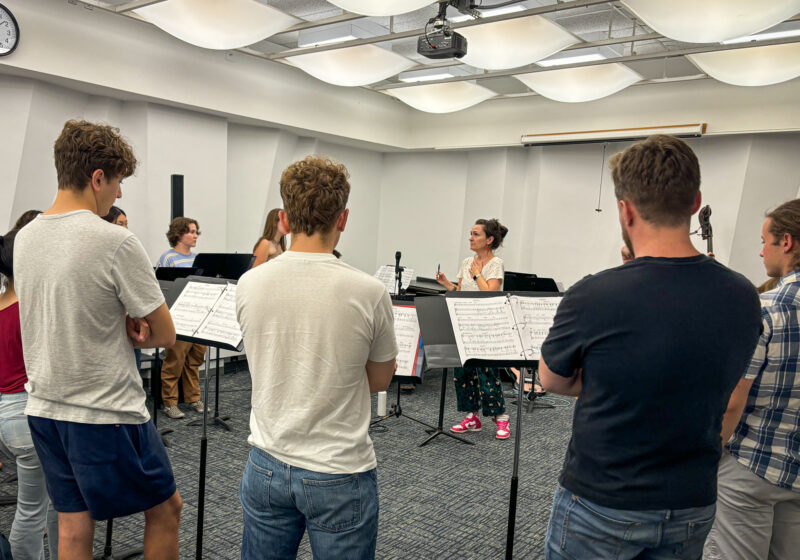Misquoted”‘They’re not in a position to criticize a private institution, and they don’t have the right to tell us not to spend money on porn,'” junior and Students’ Association Appropriations Committee Treasurer Carolyn Kaminski said.”
Since this quote was used so successfully to draw readers into articles that appeared in the last two issues of the” CT, I thought that I would re-use it to catch your attention for my response.
The first article that this statement was used in was “X-Rated Paradise” from the Feb. 20 issue of the Campus Times. The second article was a response titled “Free Press” from the Feb. 27 issue.
While I am amazed that I somehow found a way to portray myself as a highly charged, anti-First Amendment porn advocate, I have to let you know that this quote was actually a misquote, and subsequent impressions from this statement are misleading.
When I was asked for my opinion about the pornography article in the “City” newspaper, my actual response was “It’s not that they don’t have the right to tell us not to spend our money on porn…” Quite clearly, the First Amendment gives the “City” the “right” to tell us anything. However, the money that is used to fund the campus porn is money from the Students’ Association fund, paid for by students and not the community. Therefore, controversy from off campus does not have the same effect that controversy on campus has toward how money is funneled.In a response to an e-mail from me, Professor Chaisson has offered that I may include a statement that he “withdraws [his] comment about [my] need to study the Constitution” based on the fact that I was misrepresented.
As your SA Treasurer, I maintain Students’ Association Appropriation Committee’s commitment to work with SA groups to fairly manage the SA money, and I would like to clarify that I am not, indeed, an anti-First Amendment porn advocate.
–Carolyn KaminskiSA Treasurer
Strategic prioritiesMichael Katz declares “an historical examination of ANSWER exposes the backbone current anti-war movement” in the March 6 issue of the Campus Times. However, in his article Katz only analyzes ANSWER’s ideological postition. Unfortunately, Mr. Katz, the “backbone” of the anti-war movement is middle America, not ANSWER. Despite making grand generalizations about the anti-war movement or the protest on Feb. 15, Mr. Katz was most likely not at this event. Why you ask? Probably because anyone who is “informed” would know that the protest in New York City in February was not organized by ANSWER, but by United for Peace.
Mr. Katz also fails to touch on the real question at the heart of these protests. It is not who organizes the protests, but whether or not America should go to war in Iraq. The focus of the protests was not Israel. He also does not make any argument for going to war with Iraq, hence losing the opportunity to engage the protesters on the questions they were asking in D.C. and New York by protesting.
Finally, most of the protestors who went to the rallies in D.C. and New York were well aware of ANSWER’s position. In fact they did not go to the rallies out of ignorance as Mr. Katz suggests, but rather they made a strategic decision to prioritize the impending war in Iraq over ANSWER’s rhetoric.
–Mansoor KhanClass of 2003–John ZeiserClass of 2005
Protest for actionIn the recent months, I have been inundated with cries against a possible war with Iraq. However, the slogans that the protestors toss around bother me, as they have no real power in solving the actual problem. For example, I’ve seen signs that say “Drop Bush, Not Bombs.” Okay, then what? Impeach Bush, fine — I didn’t vote for him either. Then where are we? It may eliminate the immediacy of a possible war, but Iraq would still need to be dealt with. Give me a slogan for how that will happen. Don’t confuse your political frustrations with a real issue. Another one is “Let the U.N Inspections Work.” Sure, that’s an option, but I don’t believe that they will “work.”
Iraq has been under “inspection” for some time now, and what is abundantly clear is that there are issues that need to be resolved. Further inspection will not resolve the issues. A U.N.-led strategy to disarm Iraq is needed. It bothers me then, that what I think people should really be putting their voices behind is reform of the current inspection process — yet I don’t see this.
Lastly, there’s the “No Blood for Oil” sign. Have I missed something? If there is a big “oil prize” waiting for whoever topples Iraq, why hasn’t anyone beat us to the punch? Well, that’s because there is no such prize. If the U.S. needed more oil, we would simply have to back a U.N. resolution to relax the current sanctions against Iraq. Proudly holding a sign saying you won’t trade blood for oil doesn’t do anything to solve the problem, it simply tells the unbiased public — i.e., people like me — that you like your own blood.
I just think that too many people are jumping on these bandwagons having not thought through what they are really saying. Take a dump on Bush, fine. But that doesn’t solve anything. Even the higher-ups who are against military action don’t offer any solution other than “let the inspections work.” How insightful. The anti-war crowd should be working to force the U.N. to do something — it doesn’t have to be war, but it can’t be more “inspections.” Use your fat black markers and bed sheets to protest for a solution to this conflict, rather than play political games. –Joseph Carroll, Ph.DCenter for Visual Science
Constructive criticismI am writing in response to the article, “Cleopatra of mixed lineage,” in the Feb. 27 issue of the Campus Times. From what was said in the article, I understand that you disagree with the belief that Cleopatra was of black ancestry. However, while I do understand your wanting to expose what you believe to be the truth, I think that the manner in which your article was written was tacky and offensive.
There were exactly two things that bothered me about this article. First, if you even bothered to attend the Pan-African Expo, you would have experienced and learned a lot more than just a two-minute statement made about Cleopatra. I was not a part of the Expo, but being that I did witness the show and saw how spectacular it was, it’s sad to see that this was the only thing you found interesting or necessary to tell. Second, it really bothered me when you stated that this ‘claim’ was “inspired by the desire to improve the self-esteem of African-Americans.” I want to know what gives you the right to make such statement or, better yet, what causes you to believe that. I don’t think I have to go into all the major achievements and advancements made in this country by African-Americans for you to understand that such claims are not needed to boost self-esteem.
I’m not trying to be rude or mean. I just think that, in the future, you should be more careful about how you express certain feelings you have, just so you don’t come across as something or someone you’re not. I was really interested in reading your article until I read the first three paragraphs.–Erika BaileyClass of 2006




